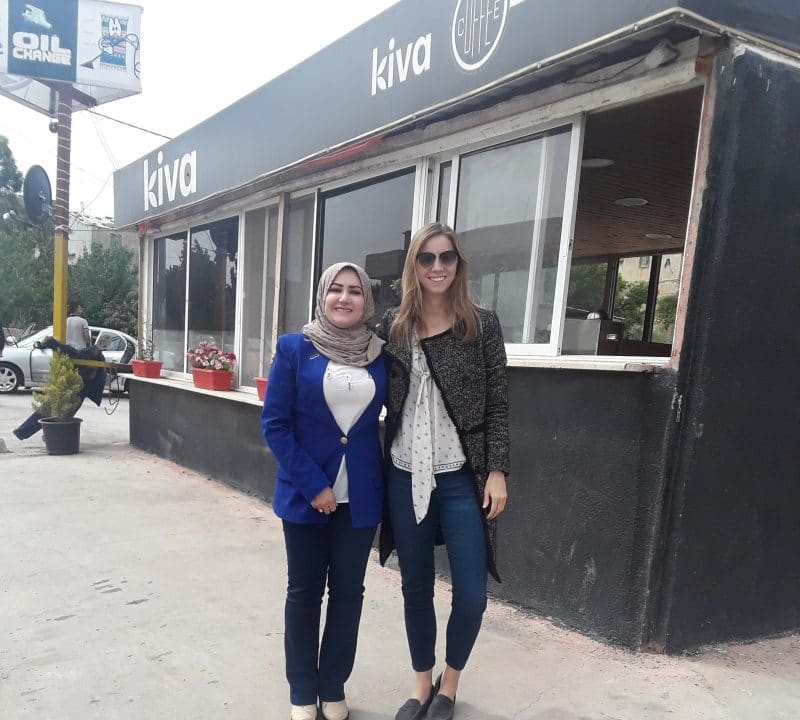
The Kiva Fellowship is a 6-month immersive experience designed to alleviate poverty through building relationships between borrowers and lenders. Young and middle career professionals in finance immerse themselves in the culture and language of a country or region while working at one of Kiva’s 300 Field Partners. Fellows get a behind-the-scenes experience and gain a new understanding of microfinance and social enterprise. Fellows, who must be at least 21 years old, are provided with a week of training in the U.S., a travel stipend, and monthly living expenses.
We talked to Kerry Frank, a current Kiva Fellow working with Al-Ibdaa and Palestine for Credit Development (FATEN) in the West Bank, to learn more about the fellowship and get some tips for preparing an application.
1. What inspired you to apply for the Kiva Fellowship?
Before Kiva, my professional experience was mostly in consulting within the digital finance and development ecosystem. In my articles and projects, I aggregated primary research from in-industry stakeholders. For instance, I collaborated with the Asian Development Bank on a white paper that dissected the inevitable role of technology in upending the business models of remittances. Many of the insights were distilled from interviews with technology solution vendors actively disrupting the space.
As a consultant, I remained one degree of separation away from innovation and on-the-ground impact. A Kiva Fellowship is the absolute antithesis to this. You are integrated directly into partner organizations all over the globe, many of which are scaling microfinance institutions. The first-hand exposure that a Kiva Fellowship affords, especially as it pertains to micro-lending to poor or vulnerable consumer segments (and the accompanying unique product development and operational challenges), is truly one of a kind. For anyone interested in financial inclusion at large, or the intersection of the private sector and economic development, I could not recommend a better program.
2. What have been some of the most eye-opening moments during your fellowship?
Perhaps my most profound observation is the universal nature of the entrepreneurial spirit. During client visits, an element of Kiva’s Borrower Verification process, I have encountered people from all walks of life who seem utterly determined to rise above the socioeconomic binds that ‘shackle’ their future outlooks. The examples that come to mind are almost countless. I had the opportunity to support the Specific Union for Farmer Women, the only organization in the Middle East dedicated to women farmers. The union’s ethos embodied the optimism that microfinance was originally supposed to represent. Crowd-sourced Kiva funded loans allowed for both the educational investment of union members and the expansion of localized commercial activities like beekeeping, spice cultivation or soap production.
While the union was a more cohesive, coordinated application of the power of finance to alleviate poverty, I also witnessed the same phenomenon time and time again on a more individualistic, micro level. From the Palestinian grandmother who tended to her five side enterprises (yes, five!) of labneh, olive oil, soap, spices, and cushion embroidery, to the young Jordanian mother who had opened a small nursery from her living room, the Kiva Fellowship reminds you to bet on humanity’s industrious nature as a way to better the world.
3. What tips would you give others applying to the Kiva Fellowship?
If I had to choose one personality characteristic that unites all Kiva Fellows, it is the ability to adapt cross-culturally. The application will quite explicitly suss this out from applicants through one or two essays. While I had the advantage of both a fairly extensive travel history and a working proficiency in Arabic, my portfolio’s desired language, some less-traveled applicants were able to communicate their adaptability through anecdotes that demonstrated their conscientiousness, humility, open-mindedness and patience.
I would also suggest including evidence that you can ‘set up shop’ and solve problems independently. While Kiva headquarters and the Fellow network is incredibly helpful, you will likely be alone in your placement country and at your partner organization. There needs to be a certain confidence that you are able to navigate the complexities of a new environment and a new institution without extensive handholding. The latter part is particularly important, as the partner’s leadership structure might be exceptionally horizontally or frustratingly vertical. Whatever the scenario you find yourself in, you are still responsible for optimizing their Kiva-specific processes within the context of their own operations.
Kerry Frank is a consultant with wide-ranging experience in digital finance and development. In her time with Mondato and HIP Consult, she has contributed to projects for clients such as the International Finance Corporation, Accion and Juvo. Her articles as Media Editor for Mondato have touched upon cryptocurrencies, digital adoption, insurance, payments, regulation and more. After her Fellowship with Kiva, she will continue to build upon her knowledge in financial inclusion through a Masters in Business Administration. Kerry earned a BA in International Studies from Johns Hopkins University and has a working proficiency in Arabic.
Interested in applying? Bookmark the Kiva Fellowship your ProFellow account.
© Victoria Johnson 2018, all rights reserved